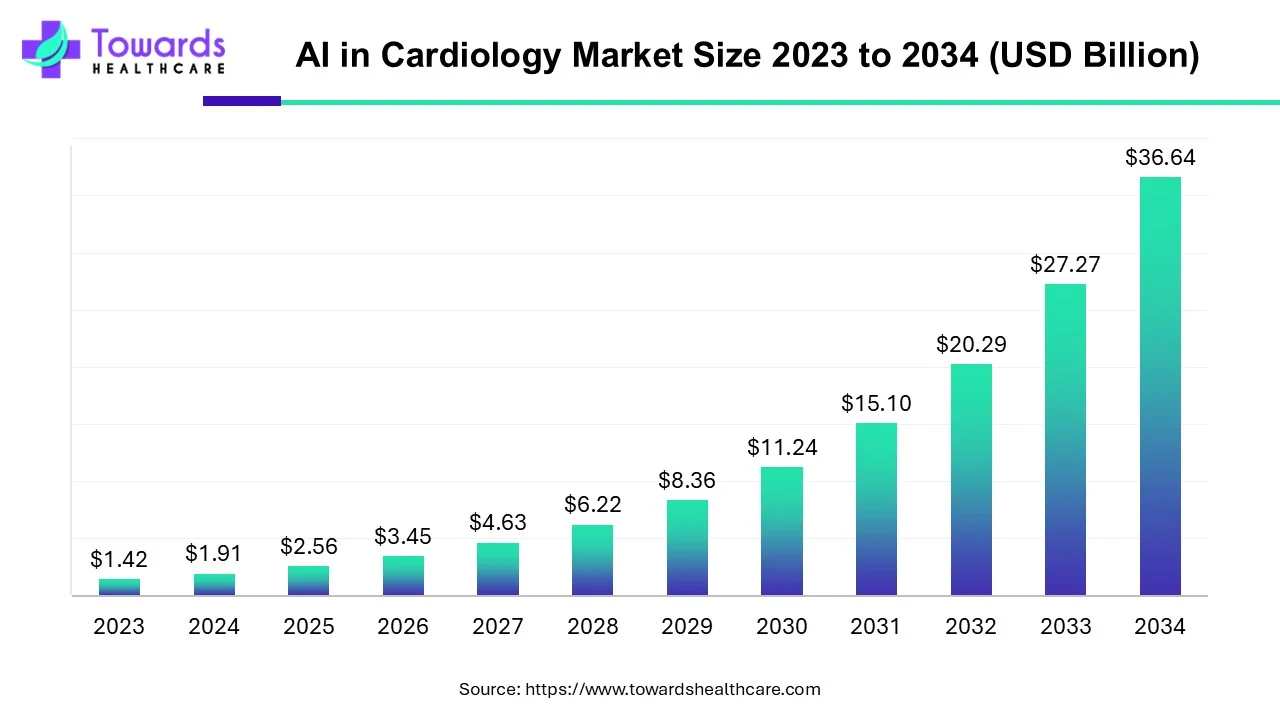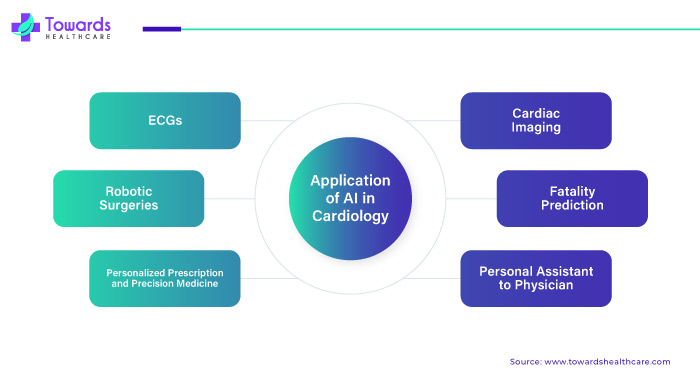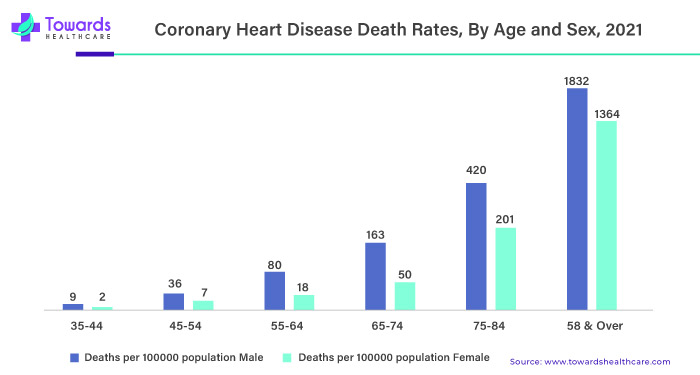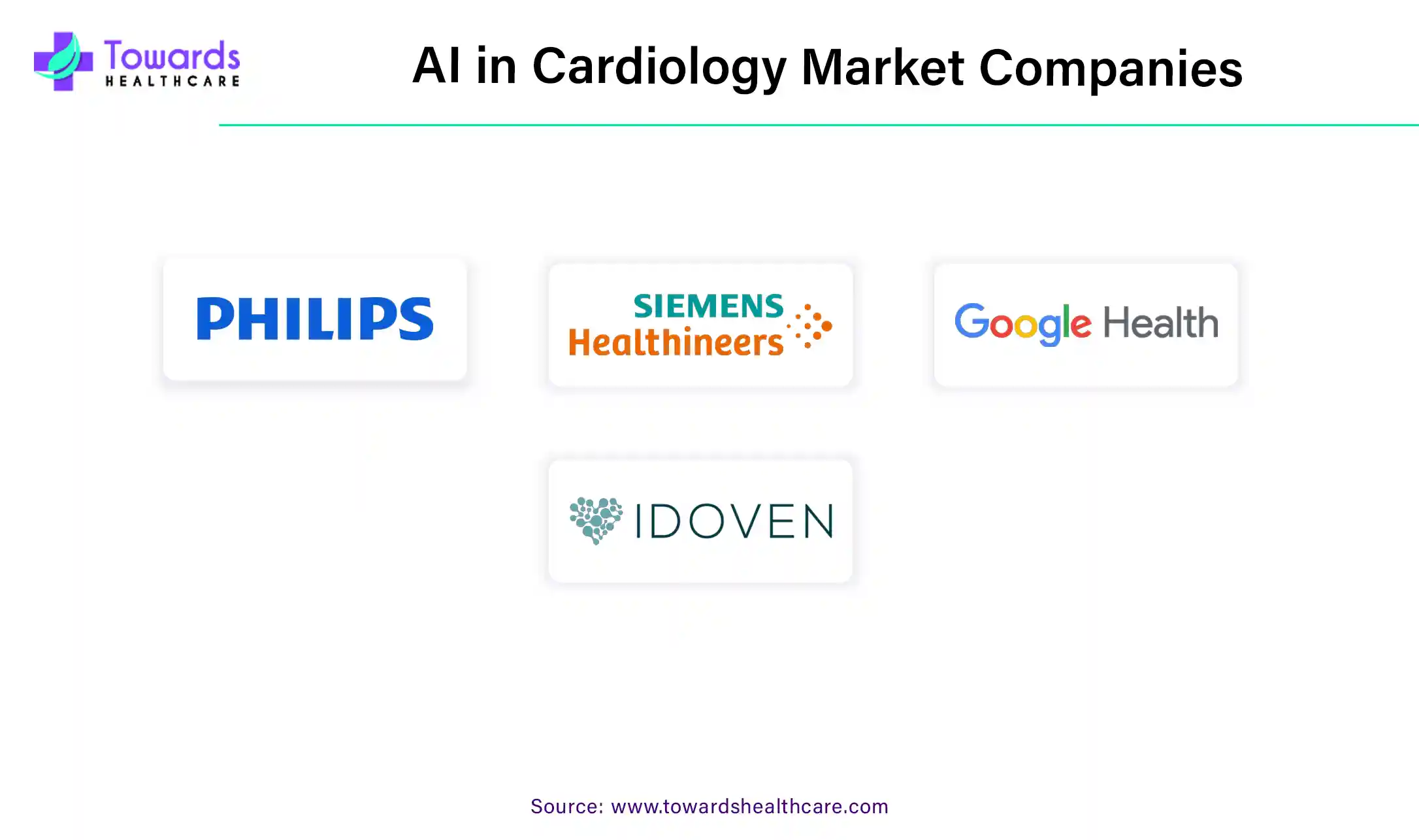January 2026

The global AI in cardiology market size is expected to increase from USD 2.56 billion in 2025 to USD 36.64 billion by 2034, growing at a CAGR of 34.38% throughout the forecast period from 2025 to 2034, as a result of the rising prevalence of cardiovascular disorders and improve technological advancements.

Accelerated Detection in Cardiology, Facilitated by AI Advancement, is Contributing to the Market Growth.
According to the World Health Organization, Heart attacks and strokes account for 85% of deaths worldwide, and cardiovascular diseases (CVDs) account for 17.9 million deaths annually, making up 31% of all deaths. Artificial intelligence helps identify cardiovascular diseases more quickly using ECGs, imaging, biomarker tracing, and atrial fibrillation assessment. This contributes significantly to the successful diagnosis and treatment of cardiovascular diseases. By helping with risk assessment, medication discovery, treatment planning, and medical diagnosis, this technology has tremendous potential to completely transform the healthcare industry.
Artificial Intelligence (AI) is the ability to instruct a computer how to solve a problem. AI is helpful because it allows computers to gather information from data and make well-informed decisions. Through machine learning and deep learning techniques, researchers have developed several systems that greatly enhance the detection of cardiovascular diseases, ultimately resulting in more accurate and efficient diagnoses. As AI proliferates, it is anticipated to benefit patients, cardiologists, healthcare providers, insurance companies, and international policymakers.
Artificial intelligence utilization includes effectively analyzing vast amounts of data and dealing with tricky medical problems. The advancement of Al techniques demonstrates the potential of Al in future cardiology for precise assessment of CVD results, non-invasive diagnosis of coronary artery disease (CAD), detection of arrhythmias through wearables, diagnosis, treatment strategies, and outcome prediction for patients with heart failure (HF). With the development of artificial intelligence (AI), the Internet of Things (IoT), and precision medicine.
Applications of AI in the department of Cardiology are given below

The global market for AI in cardiology is also growing quickly. Not only is the insertion of AI tools into cardiovascular medicine services, but it also opens up new avenues for improved patient care, streamlined procedures, and scientific advances. Accepting the potential of artificial intelligence (AI) is crucial to achieving its full impact on cardiovascular healthcare as we advance. Cutting-edge digital technologies will play a significant role in the field of cardiology in the future.
Global Market Expands Due to AI Revolution in Cardiology: This could be the Next Big Thing in Cardiovascular Medicine Sciences. The limitations of the instruments and practices used in clinical medicine today should serve as a stimulus for the growing use of Al tools in patient care. This field of innovation will expand rapidly, and many large corporations are investing in Al health care start-ups. Al is a participant in the digital revolution that is taking place in every sector of the economy. The accessibility of increasing digital data sourced from EHR and rapid advancements in computers and the web have created ideal conditions for the growth of Al.
For Instance,
Al will continue to play a significant role in many areas of cardiovascular care in the near future, including cardiac imaging, developing algorithms from large databases traced with general guidelines, and predicting risk scores and outcomes. Significant clinical and financial benefits would result from innovative Al approaches in cardiology, which would aid in providing quick, accurate, and less inaccurate patient care. Physicians shouldn't be afraid to embrace Al to improve workflow dynamics; Al technology won't replace them.
The most popular Al application at the moment is automated medical image classification. Research has shown that Al can match or surpass human experts in various image-based medical specializations, such as radiology, where a network of convolutional neural networks trained with labelled frontal chest X-rays performed better than radiologists. Cardiology's deep learning algorithm identified a heart attack with accuracy on the same level as cardiologists' work.
| Approval Date | Device Name | Parent Company Name | Description | FDA Approval Number |
| March, 2020 | AI ECG Tracker | Shenzen Carewell Electronics | Detection of Arrythmias using ECG data aquired from adult without pacemaker | K200036 |
| October, 2020 | ECG 2.0 App | Apple Inc. | Rhythm assessment Ambulatory ECG | K201525 |
| April, 2021 | Gili Biosenser System | Continuse Biometrics | Hardware and Software for Optical Camera based measurement of pulse rate, heart rate, and/or breathing rate | DEN200038 |
| June, 2021 | LINQ II Insertable Cardiac Monitor, Zelda AI ECG Classification System | Medtronic Inc. | Assessment of Arrythmia and alarm (Including ST segment measurement and alarm) | K210484 |
| June, 2022 | Atrial fibrillation history feature | Apple Inc. | Assessment of Atrial fibrillation | K213971 |
Due to this innovation, patients will receive care more quickly and accurately, and physicians can use Artificial Intelligence to enhance their practice without fear of being replaced. Regarding the future of heart health, the development of AI is significant.
An estimated 1.28 billion adults globally aged 30-79, suffer from hypertension; the majority of these individuals, or two-thirds, reside in low- and middle-income nations. It's estimated that 46% of adults with hypertension are ignorant of their illness. Only 42% of adult patients with hypertension receive a diagnosis and course of treatment. One in five adults (21%) who have hypertension can control it. Globally, one of the leading causes of premature death is hypertension. Heart attacks and strokes cause 85% of deaths.

The demand for artificial intelligence (AI) has surged globally due to the rise in CAD across the globe. The need for cutting-edge technology to support diagnosis, treatment, and overall patient care has increased as heart-related problems become more common. AI provides valuable tools for managing cardiovascular health, including risk prediction, image interpretation, and decision support. Globally, cardiovascular diseases remain the primary cause of morbidity and death, encompassing Arrhythmia, stroke, and other associated conditions. These diseases are becoming more common, which has increased the demand for cutting-edge technologies like artificial intelligence to improve early detection, diagnosis, and individualized treatment.
For Instance,
This surge in demand reflects a recognition of AI's potential to enhance the efficiency and effectiveness of cardiovascular care, addressing the challenges posed by the growing burden of heart-related conditions on healthcare systems globally.
When using biomedical AI tools, there are significant concerns about diagnosing potentially fatal conditions and the potential for inaccurate evaluations. The effectiveness of these tools, even in cases where they are accurate, depends on how people (physicians, other healthcare workers, and patients) use them. Inadequate use can result in better scheduling, more treatment, and effective interventions.
The wide availability of online and mobile AI solutions without appropriate and the general public, the lack of training provided to healthcare professionals on medical AI, and the minimal involvement of medical professionals and citizens in AI development all contribute to the inappropriate use of AI in healthcare. The impact of sizable datasets that may produce erroneous results exacerbates the misuse. Combining these factors prevents The cardiology market from adopting AI widely.
Al has numerous advantages, but there are also security and privacy concerns that need to be taken into account. The potential for hacking of data is one of the main hazards. Large volumes of highly confidential patient data are created, received, stored, and transmitted by healthcare providers. They become targets for online fraudsters and data security and privacy issues present challenges for the AI cardiology market. Combining these factors prevents The cardiology market from adopting AI widely.
By component, the hardware segment held a dominant presence in the market in 2024. Some common examples of AI hardware include wearable devices and AI-assisted medical imaging tools. It also includes patches and vests equipped with sensors. These devices enable real-time monitoring of patient vital signs such as blood pressure, heart rate, and respiration rate. Technological advancements and the availability of affordable devices boost the segment’s growth. Healthcare professionals can monitor a patient from remote places. Hardware can also improve the efficiency of disease detection non-invasively.
By component, the software segment is anticipated to grow with the highest CAGR in the market during the studied years. The software enables diagnosing patient conditions through mobile apps. It also helps healthcare providers and patients to store large amounts of patient data and access it anywhere and at any time. The advent of cloud computing boosts the segment’s growth. The software eliminates the need for the availability of favorable infrastructure to install huge devices. AI-enabled software accelerates the progression of diagnosis and treatment of CVDs.
By application, the diagnosis segment held the largest share of the market in 2024. Machine learning (ML) and deep learning (DL) algorithms are predominantly used to diagnose cardiovascular disorders in patients. They can identify coronary atherosclerotic plaques more accurately than clinicians. They can also analyze medical imaging data and detect the presence of potential diseases that are undetectable by human observation. ML and DL can also identify different disease stages. Several government organizations have imposed guidelines for the early detection of cardiovascular disorders, reducing the burden on healthcare systems. All these factors are responsible for propelling the segment’s growth.
By application, the prediction segment is projected to expand rapidly in the market in the coming years. The predictive models enable healthcare professionals to predict disease outcomes in high-risk individuals. AI can analyze potential biomarkers through various diagnostic tests. According to a study published in the American Heart Association Journal, AI/ML predicted cardiac arrest up to 50 minutes before onset in 91% of patients in the pediatric ICU, compared with only 6% by clinicians.
By medical condition, the ischemic heart disease/CAD segment led the global market in 2024. The rising prevalence of ischemic heart disease and coronary artery disease, as well as their complexities, boost the segment’s growth. It is estimated that by 2050, the global incidence and prevalence rate of IHD will reach 67.3 million and 510 million, respectively. AI plays a vital role in identifying subtle patterns and correlations, interpreting ECGs, and stratifying patients based on their risk of developing IHD/CAD. It can also be integrated with electronic health records (EHR), enhancing diagnostic accuracy.
By medical condition, the cardiac arrhythmias segment is expected to grow at the fastest rate in the market during the forecast period. Atrial fibrillation is a type of cardiac arrhythmia affecting 1.5-2% of European adults. The increasing incidence of cardiac arrhythmias potentiate the segment’s growth. AI is used to improve the detection and diagnosis of cardiac arrhythmias by analyzing medical imaging data.
For instance,
In 2024, North America led the global AI in cardiology market due to advanced healthcare infrastructure, strong regulatory support, and significant investments in research. High heart disease prevalence, integration of AI with wearables, and collaborative innovations further fueled growth, positioning the region as a global leader in AI-driven cardiac care.
The U.S. market is growing due to rising cardiovascular disease rates, advanced healthcare infrastructure, and supportive FDA regulations. Increased investments in AI research, integration with wearable technology, and adoption of precision medicine are driving demand for AI tools that enhance diagnosis, treatment, and patient monitoring in cardiology.
Canada's market is expanding due to rising cardiovascular disease rates, government-backed AI research funding, and increased adoption of AI-powered diagnostics and remote monitoring tools. The integration of AI in personalized medicine and wearable health technologies further accelerates growth, enhancing early detection and tailored treatment strategies.
Asia-Pacific is the fastest-growing AI in cardiology market due to rising cardiovascular disease rates, supportive government policies, and increased investment in AI healthcare technologies. Advancements in diagnostics, regional collaborations, and growing regulatory approvals further drive adoption, making the region a key hub for innovation and rapid market expansion.
China's market is growing due to rising heart disease cases, government support through national AI and health initiatives, and strong investment in healthcare technology. Abundant medical data, technological advances, and the integration of AI in hospitals enable early diagnosis and personalized care, driving rapid market expansion across the country.
India's market is expanding due to rising cardiovascular diseases, a shortage of specialists, and the need for early diagnosis. Government initiatives like Ayushman Bharat and health-tech startups are driving AI adoption. AI enhances diagnostics, personalizes care, and improves rural healthcare access, fueling significant market growth.
Europe's AI in cardiology market is growing notably due to increasing investments in digital health, cross-border research collaborations, and strong academic-industry partnerships. Public awareness of heart health, demand for efficient clinical workflows, and adoption of electronic health records are also boosting AI integration in cardiovascular diagnostics and treatment solutions.
The UK’s market is rising due to high heart disease rates, strong government funding, and NHS-driven innovation. AI tools like 3D heart scans improve diagnostics and reduce costs. Collaborations with tech institutes and supportive regulations further accelerate adoption, enhancing patient outcomes and healthcare efficiency nationwide.
Germany’s market is growing due to strong research infrastructure, high heart disease rates, and supportive government policies. Collaborations with global institutions and rising demand for precise, non-invasive diagnostics are accelerating AI adoption. The healthcare system’s digital transformation further drives innovation and market expansion in cardiology solutions.
Coronary artery disease (CAD) is the most common type of heart disease in the U.S., according to the Centers for Disease Control and Prevention (CDC). Heart disease-related medical costs are predicted to soar in the United States, from $126.2 billion in 2010 to $177.5 billion in 2040, a 41% increase. A robust healthcare system, the quick uptake of cutting-edge products, and the region's growing number of new artificial intelligence (AI) product approvals by regulators are some of the factors driving this upward trend.
Innovation and Collaboration
Asia-Pacific is projected to expand rapidly in the market in the coming years. The crude prevalence of CVDs is estimated to reach 729.5 million in Asia, a 109% increase from 2025. It is anticipated that the region's prevalence of cardiovascular disease (CVD) will rise sharply due to factors like an aging population, growing healthcare facilities, and an increase in the incidence of cardiovascular illnesses. For example, the Asian Development Bank projects that by 2050, one in four people in Asia and the Pacific will be over 60, or approximately 1.3 billion seniors—a fourfold increase in the population between 2010 and 2050.
Dr. Atul Gupta, Chief Medical Officer of Diagnosis and Treatment at Philips, commented that cardiology leaders are quickly realizing the potential of AI, with 40% saying their organizations plan to invest in generative AI in 12 months. He also said that by leveraging AI across their advanced technology portfolios, the company’s integrated solutions can help solve cardiology’s daily challenges.

By Component
By Application
By Medical Condition
By Region
January 2026
January 2026
January 2026
January 2026